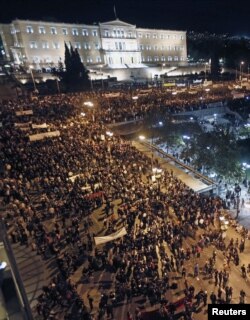LONDON —
Greek politicians are debating a fresh round of spending cuts and tax hikes, as the country faces a second day of nationwide strikes against the austerity measures.
If parliament passes the austerity package, Greece will be in line to receive around $40 billion in aid from its international lenders. Without the international loans, Greece could default on debt due to be paid later this month.
But there are deep divisions, within Greece and in parliament, over whether the austerity measures are the right move forward. Along with spending cuts and tax hikes, the plan includes changes to labor laws, making it easier for businesses to hire and fire workers.
Many in Greece say more tax hikes and spending cuts will bring the Greek people to their knees. Members of the smallest party in the country's conservative-liberal coalition have opposed the measures, as has the leftist opposition.
Parliament Member Zoe Kostantopoulou from the left-wing anti-bailout party Syriza spoke during Wednesday’s parliamentary debate.
She said the bill has come to parliament as blackmail, in a fast-track process, with the government asking lawmakers to vote either yes or no, without having read it, without examining it, and without allowing it to be discussed. She said it is an insult to the democratic process.
But Prime Minister Antonis Samaras is expected to narrowly win support for the controversial measures.
That will be bad news for protesters who gathered on the streets of Athens for the second day of protests against further austerity. Public transport, schools, banks and government offices remain shut down.
Elsewhere in Europe, there was more bad news as the European Union forecast a much sharper economic slowdown on the continent than had previously been predicted. The European Commission said growth in the eurozone in 2013 will be as little as 0.1 percent, instead of the earlier prediction of one percent.
A director at wealth-management firm Integral Asset Management, Nick Dewhirst, said Greece and some other eurozone countries will not be able to stay in the monetary union for long. He said Greece should make a swift exit and work on rebuilding its economy with the old Greek currency, the drachma.
“We have been building up to the likelihood of this," he said. "At what point actually the great eruption happens, that is incredibly difficult to predict. One must never underestimate the ability of politicians to delay the inevitable.”
Prime Minister Samaras has said the latest package will be the last cuts to wages and pensions.
If parliament passes the austerity package, Greece will be in line to receive around $40 billion in aid from its international lenders. Without the international loans, Greece could default on debt due to be paid later this month.
But there are deep divisions, within Greece and in parliament, over whether the austerity measures are the right move forward. Along with spending cuts and tax hikes, the plan includes changes to labor laws, making it easier for businesses to hire and fire workers.
Many in Greece say more tax hikes and spending cuts will bring the Greek people to their knees. Members of the smallest party in the country's conservative-liberal coalition have opposed the measures, as has the leftist opposition.
Parliament Member Zoe Kostantopoulou from the left-wing anti-bailout party Syriza spoke during Wednesday’s parliamentary debate.
She said the bill has come to parliament as blackmail, in a fast-track process, with the government asking lawmakers to vote either yes or no, without having read it, without examining it, and without allowing it to be discussed. She said it is an insult to the democratic process.
But Prime Minister Antonis Samaras is expected to narrowly win support for the controversial measures.
That will be bad news for protesters who gathered on the streets of Athens for the second day of protests against further austerity. Public transport, schools, banks and government offices remain shut down.
Elsewhere in Europe, there was more bad news as the European Union forecast a much sharper economic slowdown on the continent than had previously been predicted. The European Commission said growth in the eurozone in 2013 will be as little as 0.1 percent, instead of the earlier prediction of one percent.
A director at wealth-management firm Integral Asset Management, Nick Dewhirst, said Greece and some other eurozone countries will not be able to stay in the monetary union for long. He said Greece should make a swift exit and work on rebuilding its economy with the old Greek currency, the drachma.
“We have been building up to the likelihood of this," he said. "At what point actually the great eruption happens, that is incredibly difficult to predict. One must never underestimate the ability of politicians to delay the inevitable.”
Prime Minister Samaras has said the latest package will be the last cuts to wages and pensions.
